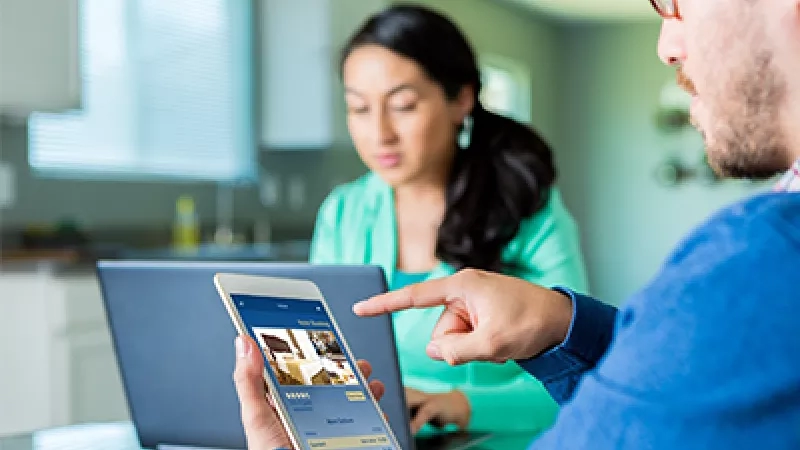With states reopening their businesses, travel is beginning to resume. As a result, guest engagement and experience, as well as guest care, must shift to meet the needs of those who are staying at hotels. In this edition of our weekly blog series, Good Works and Great Ideas, which we publish every Friday, we give tips for how to improve and adjust guest engagement at your hotel. We also provide examples from the industry of what other hotels are doing to accommodate travelers during this time.
Great Ideas: 7 ways to boost guest engagement during COVID-19
Guest engagement — and the overall hotel customer experience — is essential for winning repeat business. At its core, guest engagement involves touchpoints along a guest's stay, like the booking process, check-in and out, on-site services, and staff interactions. The challenge comes in transitioning these touchpoints to virtual, or reducing them entirely, while still maintaining a sense of human connection. With the new expectations of travelers, adjusting to meet these needs while still making guests feel comfortable and safe will be crucial. It’s all about using what you know about the guest to customize their stay and make the experience better for them.
As you prepare your hotel for travelers during COVID-19, here are a few ways you can adjust your offerings to make a better and safer experience for guests, thus increasing engagement.
1. Provide PPE kits
Stocking guest rooms with personal protective equipment (PPE) kits before guests arrive is an extra perk hotels can offer to ensure a more comfortable – and safe – stay. Masks, travel-sized hand sanitizers, and disinfecting wipes are a few things to include in the kit.
The Westin Houston Medical Center, for example, packs different kits with health and energy benefits that include travel-sized Airborne products. The hotel has also adapted their F&B offerings to include immune-boosting foods with more antioxidants, vitamins, and probiotics.
2. Devote a staff member to guest engagement and cleanliness
Free up a staff member from checking people in at the front desk and devote them to paying personal attention to guests on site. They can provide information about restaurants and businesses that are open in the area, inform guests about the state’s health and safety guidelines, and ensure they have everything they need to feel safe and comfortable during their stay.
Event planners can be valuable guests for engagement! Check out our guide to learn more
Appoint a cleanliness manager to serve as a point-person for any health or cleaning questions from guests or the health department. It's the cleanliness manager’s responsibility to make sure employees are adhering to the cleaning protocol and to assure that the property is in compliance with all health and safety standards. Having one clear person who is responsible for this will make any inspections go more smoothly and give the guests someone to turn to if they have questions or concerns.
3. Get your property certified in cleanliness and sanitization
According to a recent Skift article, cleanliness has become one of the three most important factors when it comes to recovery and winning business in the future — it’s not just about the prime location of your hotel anymore. Guests want to know that your property is clean, and they want to see proof.
Thoroughly cleaning all surfaces and regularly wiping down high-touch areas goes without saying. To go above and beyond and provide your guests with extra peace of mind, consider getting your property cleaning protocol certified for excellence. The Global BioRisk Advisory Council GBAC Star program, for example, is created by scientists who have consulted with the Centers for Disease Control and Prevention. The program serves as a third-party validation that your hotel is implementing the industry’s highest cleaning standards and is safe for guests and events.
Another certification is the WELL Health-Safety Rating, which would affix a safety rating seal on a hotel’s front door. WELL Building Standards are centered on maximizing the health and wellness of the hotel guests. In addition to each having their own safety standards, hotel companies like Mandarin Oriental, Loews, and Montage International are also on the WELL advisory board.
4. Implement deep cleaning and disinfecting technologies
Deep cleaning is a term floating around in the industry, but what does it really mean?
Deep cleaning isn’t that different from normal disinfecting procedures – it’s mostly about the frequency and types of cleaners used. For hotels, it means cleaning high-touch areas and disinfecting surfaces more often, having hand sanitizer stations available throughout the property, and using cleaners recommended by the CDC and EPA as effective against the virus. Some hotels, if they are able, are letting rooms rest for 24 hours after guests check out before cleaning and ventilating the room.
LightStrike Germ-Zapping Robots are the latest development in methods for deep cleaning. The robots use UV light to destroy bacteria and viruses that may not have been caught during the manual cleaning process. The Westin Houston Medical Center is the first and only hotel to use the ground-breaking room disinfecting technology.
Additionally, Troutbeck, a resort in New York’s Hudson Valley, upgraded its HVACs with a new high-efficiency particulate air (HEPA) filtration system that includes a UV light to kill even more germs. Other hotels are improving their disinfectant methods by using electrostatic sprayers that can distribute 360-degree coverage. The disinfectant then adheres to surfaces, allowing for extra germ-fighting.
As another way to assure a clean property, consider partnering with cleaning companies and health institutions to create your own health and safety initiative and standards — for example, Hilton created CleanStay in part with Lysol and the Mayo Clinic, and the Four Seasons is collaborating with Johns Hopkins Medicine International.
5. Rethink amenities — in-room and on-property
Inside guest rooms, some things may need to change to cut down on contact and the chance for the virus to spread. Things like pens, paper, magazines, and decorative pillows and runners might be removed due to the difficulty in cleaning or replacing them after every guest. Single-use plastic toiletries might make a comeback as well, rather than multi-use bottles, to mitigate the spread of the virus.
Nancy Huang at Pegasus, a hotel technology solutions provider, suggests having the guests select their in-room amenities prior to arrival. That way, the items can be delivered fresh and freshly sanitized – and, unwanted items won’t go to waste because the guest will only be asking for the items they intend to use. Allowing guests to request items for a pre-stocked minibar before they arrive can be another way to assure a sanitized and safer guest experience and reduce the number of contact points.
There might be an increase in guests utilizing room service because of a desire to maintain social distancing and reduce contact with other people. Hotels should be prepared to offer in-room dining options delivered by staff trained in proper food-handling and sanitization methods. Also consider having grab-and-go meals and snacks available for quick pick up from the lobby.
For the pool and the gym, increased sanitization measures should be implemented, like having an attendant with a facemask wipe down chairs and equipment in between uses and making sure guests stay six feet apart. Spa offerings will likely be cut back to treatments with minimal contact, also with staff wearing PPE.
6. Get a mobile app for your hotel
To reduce touchpoints and create a more seamless and safe stay for guests, hoteliers should consider utilizing a mobile app. Apps can house a variety of different features and amenities, all centered on making it as easy as possible for guests to stay at your hotel and feel safe while doing so, which, in turns, helps boost engagement.
Through a mobile app, guests can do contactless check-in and -out, as well as contactless payment. Some apps will even allow guests to turn their smartphones into room keys, further reducing the need for hotel staff to sanitize keycards after guest use. Guests can also use the app to order room service or request additional in-room amenities without needing to leave their room. For example, the Hilton Honors App can check-in and unlock rooms, and guests can also use it to make special requests for things like food or extra pillows. Hotels can use the app to supply information about the property and the surrounding area, and list any important health and safety updates.
7. Redesign spaces for social distancing
Designing spaces where we can “be alone together” – semi-private zones that maintain social distancing standards while still incorporating social dynamics – will likely be the new norm for hotel lobbies and public areas. Adapting outdoor space for dining and providing lounge areas that would normally be inside is another way to offer an area for guests other than their rooms while still adhering to social distancing.
There are many ways for hotels to do this, including using our diagramming tools to design what hotel spaces will look like in the future, down to the last detail. With these tools, hotels can update layouts with new health and safety objects, such as temperature-checking stations and social-distancing floor stickers, as well as ensure that all social-distancing guidelines are being met with the use of the new and innovative Diagram Check tool.
Good Works: How hotels have modified offerings and procedures to boost guest engagement
As great ideas help to get group business back on track, good works show how hotels are putting these great ideas into practice. We’ve gathered some examples from the industry of hotels offering new options and adjusting their existing services to provide a socially-distant and contact-free stay.
1. Hotels add curbside check-in, outdoor food options, and on-demand medical care
The Sunriver Resort in Sunriver, Oregon has modified its check-in process to a curbside service. Guests call before arriving and hotel staff meet them at their cars with their room key, eliminating the need to enter the lobby and wait in line.
Other hotels have adjusted their food and beverage options and taken the dining experience outside of the hotel restaurant. The Resort at Paws Up in Montana, situated on a 37,000-acre ranch, constructed an outdoor open-fire kitchen and added a pizza food truck. Guests can eat outdoors at the many picnic tables and pavilions scattered around the property.
Since gathering at the hotel bar won’t be permissible under social distancing restrictions, Ocean House in Watch Hill, Rhode Island came up with a workaround. A staff member will take a bar cart door to door every day during happy hour to offer drinks and complimentary canapés. Ocean House has also added a pop-up taco stand offering tacos and cocktails to-go.
Montage International has partnered with One Medical to provide guests with on-demand virtual health care while on property and for one month after their stay. Guests will receive a 30-day membership, which will allow them to access in-person services at a One Medical office, as well as virtual care options. Montage is also giving its U.S.-based staff annual memberships to the healthcare service.
2. Wynn Las Vegas reopens with new 30-page cleaning and social distancing memo
Wynn Las Vegas published a detailed document that covers all of their new cleaning protocols and new policies to assure social distancing. Here are a few highlights of how the resort plans to accommodate guests and provide a safe environment:
- Pools will require a reservation ahead of time and are limited to 50% capacity.
- Spa treatments will be socially distant as well, and will be held in private rooms.
- Each room will be equipped with a sanitizer spray bottle or disinfecting wipes.
- Pre-COVID-19, the rooms already had Amazon Alexa for touch-free control of the lights, air conditioning, and blinds.
- Wynn will also have a 24-hour cleaning team disinfecting all areas, and there will be 300 hand sanitizer stations throughout the property.
It's all about guest engagement at your hotel!
Times may be changing, but what hasn't changed is the importance of the guest and how they feel about your brand. Up next, check out some must-know tips to improve your hotel SEO and boost business.







